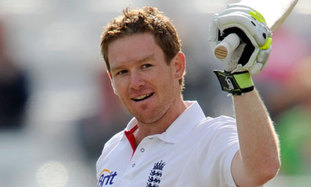 Eoin Morgan: The Irish Cricketer who Captains England
Eoin Morgan: The Irish Cricketer who Captains England Monday’s success at the Cricket World Cup by Ireland over the West Indies is fueling a debate about the development of cricket in Ireland and the opportunities for the non-Test Playing nations. The ICC displays elements of a sporting cartel, which makes it difficult for any team outside the test status nations to decide games, funding and even participation at the next world cup.
Ireland have history when it comes to upset victories, defeating Pakistan in 2007, England in 2011 and now West Indies. These results prove an ability to compete at the top level. Ireland is ranked 11th in the world and have associate nation status. Only ten countries have test status. Ireland have achieved these victories with just nine One Day Internationals (ODIs) against Test playing nations in the past four years. England have played 21 ODIs in 2014 alone against Test status nations. The top eight teams in particular have a clear advantage in that tours and schedules are very much geared to their needs. The victory has further muted the ICC's claim that cricket is only competitive among eight teams on which they are basing the restriction of the next World Cup to ten teams. Of course, one victory at a world cup does not warrant a change in rules, however if Ireland were to advance from their group by finishing in the top four of seven, the ICC would certainly have to reconsider its position.
A comparable situation perhaps is the Rugby World Cup, which facilitates 20 teams. It is comparable in the sense that there is a limited number of ‘top’ teams. Since 2000, rugby has increased the traditional tournaments in the Northern and Southern hemisphere to six and four teams respectively to promote the development of the game in Italy and Argentina. A veritable cartel approach in cricket means that the traditional nations (top 8) have a guaranteed income stream from tours and matches against each other. It suits these teams, as revenue does not have to be diluted among further nations. The ICC is off setting future development outside of these countries to maintain the status quo for existing test nations.
Further to this Ireland has the problem that players who stay with Ireland do not get the opportunity to play test cricket, which has meant some players have switched allegiance to the England and Wales Cricket Board (ECB). Most notably the current England ODI captain Eoin Morgan and Boyd Rankin. Virtuous and vicious cycles emerge under the current arrangement.
If the associate nations are to be competitive which is the excuse for reducing the world cup numbers, then Ireland , Scotland, UAE, Afghanistan and Netherlands have to be ,at the very least, given an opportunity to play against the test status nations, particularly against the top eight (Australia, England, India, New Zealand, Pakistan, South Africa, Sri Lanka and West Indies).
The term upset and giant killing has been used to describe Ireland’s most recent victory. This is perhaps a truism in the sense that our team has limited opportunities to beat a traditional cricketing powerhouse. However if Ireland continually defeat these nations which they have in world cups then perhaps it will become more expected of them.
Most sports have a top tier, however most sports incentivise the lower tier nations by offering a chance to promote themselves. The induction of many smaller states in international soccer is testament to this. In international soccer and rugby newer states may not drastically improve but it serves to develop the sports. This is currently not the case in cricket.
 RSS Feed
RSS Feed